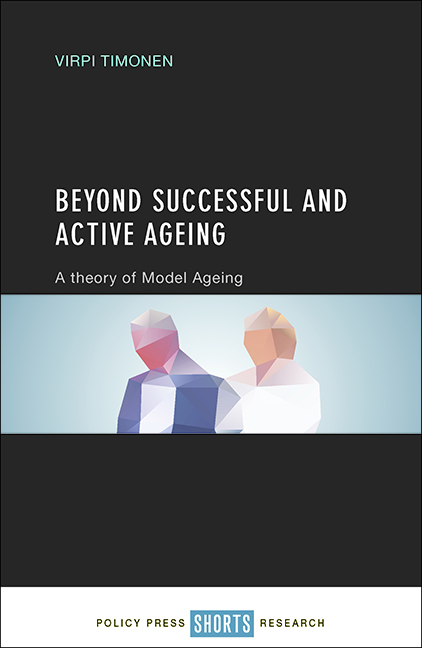One - Paradoxes and puzzles in ageing societies
Published online by Cambridge University Press: 01 September 2022
Summary
Puzzlement and curiosity underlie all discoveries and advancement of understanding. The discourses and scripts around ageing are replete with paradoxes, puzzles and contradictions that make me wonder about the ageing societies we live in. Paradoxes, puzzles and contradictions can be frustrating in practice, but they are also ripe material for theorising because they make us ask: ‘why do they exist?’ and ‘what do they tell us?’ – and even ‘whose interests do they serve?’ In the course of seeking to understand seemingly irreconcilable and contradictory phenomena, theory in the sense of accounts of what explains the existence of and relationships between (conflicting) concepts emerges. I will begin by drawing out some of the key paradoxes and puzzles in contemporary ageing-related discourses, with a view to identifying sensitising concepts that are important starting points in developing new critical insights and theory.
Despite policy documents, marketing and media exhorting older adults to remain active contributors to society and to maintain their independence, older adults are often construed in ambivalent terms in parallel discourses. The paradigms of active and successful ageing (and the centrality of agency and individual responsibility inherent in these) are evident in, for example, the expectation that older people must act as ‘informed consumers’ who make choices and assume responsibilities regarding their own care (Bertelsen and Rostgaard, 2013). Yet older adults (especially those with care needs) are often treated as lacking personhood and agency (O’Dwyer and Timonen, 2010). I label this
• the paradox of (in)dependence: exhorting independence among a group of people who are simultaneously construed as dependent and vulnerable.
What might explain this paradox? I will offer explanations in subsequent chapters, but my opening gambit is that this paradox exists because policy and literature are in fact not referring to the older population in totality but, rather, sending messages about sub-groups that they consider somehow problematic, in contrast to groups that are adhering to ideals of ‘ageing properly’.
Policy aspirations pertaining to older populations have a strong gender dimension, both because women form the majority in older populations and because the aspirations have more extensive ramifications for women's life courses, which have traditionally diverged more than men's from some of the paths and patterns that are now prescribed (especially with regard to paid work).
- Type
- Chapter
- Information
- Beyond Successful and Active AgeingA Theory of Model Ageing, pp. 1 - 12Publisher: Bristol University PressPrint publication year: 2016

